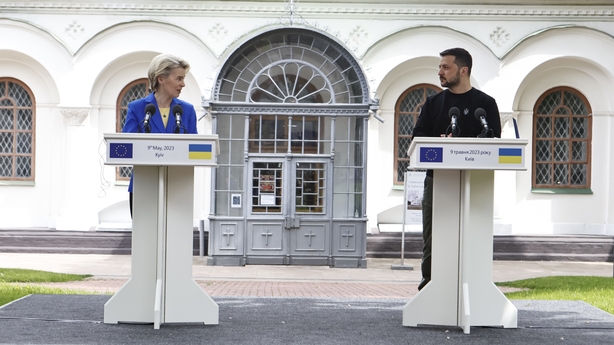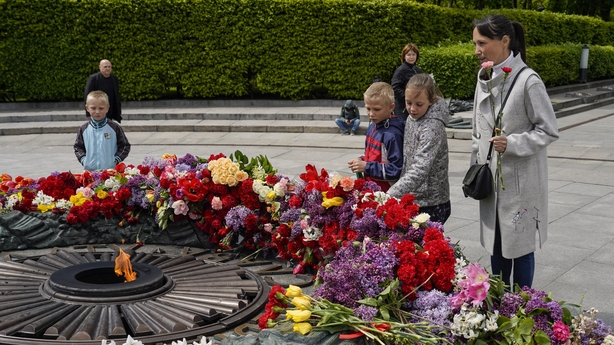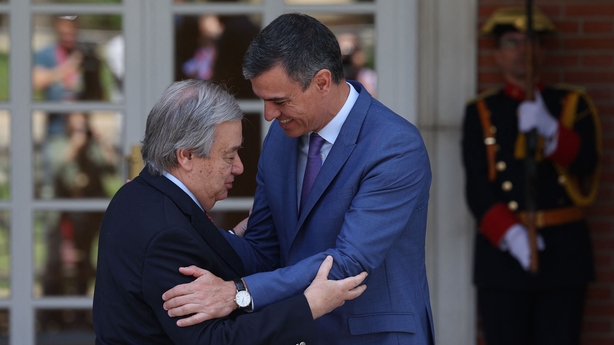Ukraine has warned that it needs more and faster support from Brussels, including a clear path to EU membership, as European Commission president Ursula von der Leyen made her latest visit to Kyiv.
Ms Von der Leyen was in Kyiv to mark Europe Day, which promotes peace and unity on the continent and falls on the same day that Moscow celebrates the Soviet victory over Nazi Germany in 1945.
Standing alongside the European Commission head, Ukrainian President Volodymyr Zelensky urged the EU to speed up ammunition deliveries, lift "unacceptable" restrictions on Ukrainian grain exports and begin talks on Ukraine's EU accession.
"The time has come to remove the artificial political uncertainty in the relations between Ukraine and the EU," Zelensky told a joint press conference.
"The time has come to take a positive decision on the opening of negotiations on Ukraine's accession to the EU," he added.
Ms Von der Leyen is to hand EU member state leaders a report in October on Ukraine's progress in democratic and anti-corruption reform. At that point, members will have to decide whether to launch formal EU membership talks.
She arrived in the Ukrainian capital for a series of what she called "intense" meetings as Kyiv plans to launch a spring counteroffensive against Russian forces, more than a year into Moscow's invasion.
"Ukraine is fighting for the ideals of Europe that we celebrate today. In Russia, (President Vladimir) Putin and his regime have destroyed these values. And now they are attempting to destroy them here in Ukraine," Ms von der Leyen said.
"But the aggressor has already dramatically failed. Ukraine has resisted the attack and is fighting back successfully," she added.

'Severe, even cruel'
President Zelensky thanked her for the EU decision to provide Ukraine with one million artillery shells but insisted on the need to deliver them more quickly.
"The need for them on the battlefield is already present," he said.
He then addressed restrictions on Ukrainian grain exports imposed by neighbouring EU nations - a source of tension among the allies.
"All restrictions on our exports are completely unacceptable right now. They only reinforce the abilities of the aggressor," Zelensky said.
"We are waiting for the EU to stop all restrictions as fast as possible," he added, calling the measures "severe, even cruel" and "disappointing" in times of war.
The EU members involved - Bulgaria, Hungary, Poland, Romania and Slovakia - have sparred with Ukraine in recent weeks over the grain issue.
Russia's invasion severely limited the traditional export channel of Ukrainian grain via the Black Sea, necessitating export overland via Ukraine's neighbours.
Member states agreed to allow the import of certain products from Ukraine without quantitative restrictions, and without customs and official inspections.
But farmers in some of the EU countries protested after a slump in prices, prompting a raft of restrictions and bans on Ukraine's food exports in response.

Years of accession talks
Brussels called the bans "unacceptable" while Kyiv is at war with Russia.
Last month the European Commission reached an agreement with all the parties concerned to ensure the transit of Ukrainian grain exports through EU countries, however with restrictions.
Speaking alongside Zelensky, Ms von der Leyen on Tuesday described the grain situation as "difficult".
"The immediate priority now is that the grain transit goes seamlessly and at the lowest possible cost outside from Ukraine towards the European Union," she said.
"This requires a very close cooperation of the different stakeholders. Therefore, we will jointly set up a coordination platform."
The European Commission is due to give an interim opinion on Kyiv's progress to EU member state leaders in the coming weeks and the formal written report follows in October.
There is much good will for Ukraine in EU capitals, but also scepticism that a country with such a troubled recent history will be in shape to begin formal accession talks this year.
Brussels estimates that once they begin, the talks could take six to 10 years, while Kyiv has more optimistic hopes.
Missile attacks overnight
Ukraine said its air defences had shot down 23 of 25 Russian cruise missiles fired chiefly at the capital Kyiv overnight, and there were no reported casualties.
Russia's defence ministry said it had "launched a concentrated strike using high-precision, long-range sea and air-based weapons aimed against enemy barracks and ammunition depots".
After a weeks-long hiatus, Russia in late April resumed its tactic of long-range missile strikes against Ukraine and has launched a flurry of attacks in recent days.
Peace negotiation 'not possible'
UN Secretary General Antonio Guterres said he sees no immediate possibility of reaching a comprehensive ceasefire in the war in Ukraine as both sides are convinced they can win, according to an interview published by Spanish newspaper El Pais today.
Mr Guterres, who is in Spain to receive the Charles V European Award, told El Pais the UN was instead focusing on talks with both Russia and Ukraine to solve concrete problems such as extending the Black Sea grain deal that is set to expire on 18 May.

"Unfortunately, I believe that at this stage, a peace negotiation is not possible. Both sides are convinced that they can win," Mr Guterres said.
"At the moment, I do not see any possibility of achieving immediately - we are not talking about the future - a comprehensive ceasefire, a peace negotiation," he added.
Asked about mediation efforts by China or Brazilian leader Lula, Mr Guterres stressed that achieving peace in the conflict could not happen at the moment, though he hoped that "in the future it will".
He also praised Beijing's position on nuclear escalation being "unacceptable", describing it as "very important to avoid a temptation that would be an intolerable absurdity".
Nuclear tension has surged since Russia's invasion, as President Vladimir Putin has repeatedly warned that Moscow is ready to use its nuclear arsenal, if necessary, to defend its "territorial integrity".
